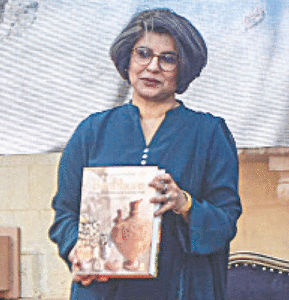KARACHI: The phrase ‘comedy is a serious business’ does not insinuate that every comedic act and funny presentation has serious undercurrents. It means that doing comedy for an audience should not be taken lightly — it requires as much attention and care as any ‘serious’ work of art.
Thespianz Theatre’s take on known humourist Dr Younus Butt’s piece ‘Ghar Mastiyaan’ in the PACC auditorium on Wednesday evening had its moments which rib-tickled the audience, but given that the script and characters were familiar to theatre-goers, the production value in totality could have been a little better.
Directed by Faisal Malik and Robert Neumann, ‘Ghar Mastiyaan’ can be considered as two condensed episodes of the famous television drama series ‘Family Front’. It tells the tale of a goofball of a family the only ostensibly ‘normal’ member of which is its head, Azam (Syed Muhammad Farhan). His wife, Sumbul (Aza Shamsi), doesn’t have any regard for her husband’s hard-earned money; his son Bobby (Muhammad Anas) is bad at studies; daughter Huma (Kiran Shayari) lives in her own world; and Azam’s sister Nusrat (Kanwal Fatima) is an unmarried 30-something woman who joins Sumbul in every stupid move that she makes.
The first part of the play deals with Bobby’s terrible performance in intermediate exams which the entire family tries to hide from Azam. For which they seek help from Khushia (Rabeet Malik), who appears to have a solution to every problem under the sun. The second half is to do with the money that the husband had sometime back given to the wife but she doesn’t have it anymore. In order to hoodwink Azam, they plan a robbery in their own house, which after some crazy twists and turns results in their favour.
There’s nothing extraordinary about ‘Ghar Mastiyaan’. This doesn’t mean that its simple production value and somewhat amateurish performances by the actors didn’t engage the audience. There were many instances that genuinely made theatre-goers laugh, though most of the time it was a gentle smile that the drama elicited from them. It could be attributed to the fact that Dr Younus Butt’s lines don’t pleasantly surprise us with the same force as they used to when the writer first burst onto the showbiz scene, because we know that the repartee is not leading to a conclusive point but to a funny counter remark. Still, Dr Butt can tickle your funny bone like no one else.
For example, in a scene when the family is planning to invite a dacoit to their house, one character raises the issue how will the robber know about the amount of money, to which another character quips, ‘daku paisey gintey nahin, wo akhbar mein parh laitey hain ke kitney ka daka tha’ (dacoits don’t count the looted money, they read about the amount next day in the newspapers).
Some such exchanges drew a total blank from the audience because the actors seemed to be in a rush to say their lines. On one instance when Azam is told that Bobby is taking a bath, he feels surprised and says ‘wo naha raha hai, wo to kehta hai usey painter banna hai’ (he is in the shower, strange, because he wants to be a painter).
All the actors spoke so fast, except perhaps Muhammad Farhan, that it was very difficult to enjoy a sequence for more than a couple of seconds. That being said, there was negligible overlapping or forgetting of dialogue and given the fact that the performers are young and nonprofessional, their hard work should be appreciated. The directors’ too tried their best to add colour and fizz to the situations, succeeding to a reasonable extent.
The play was staged in collaboration with the PACC and Goethe Institute.
Published in Dawn, October 2nd, 2014













































Dear visitor, the comments section is undergoing an overhaul and will return soon.